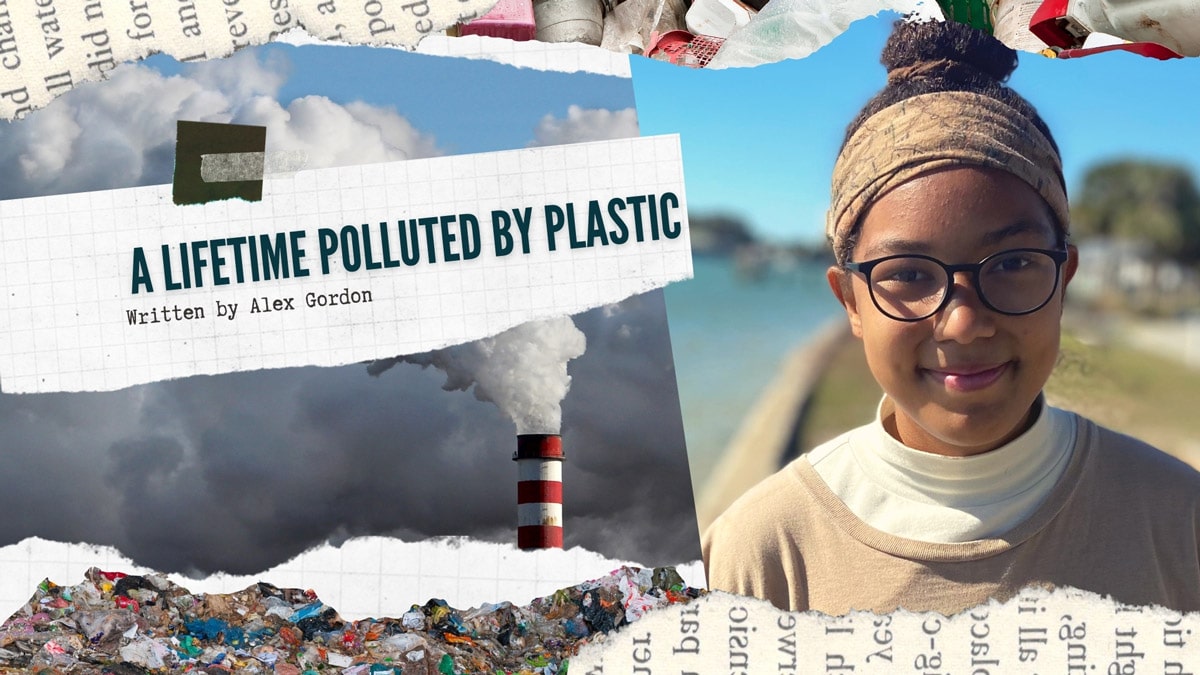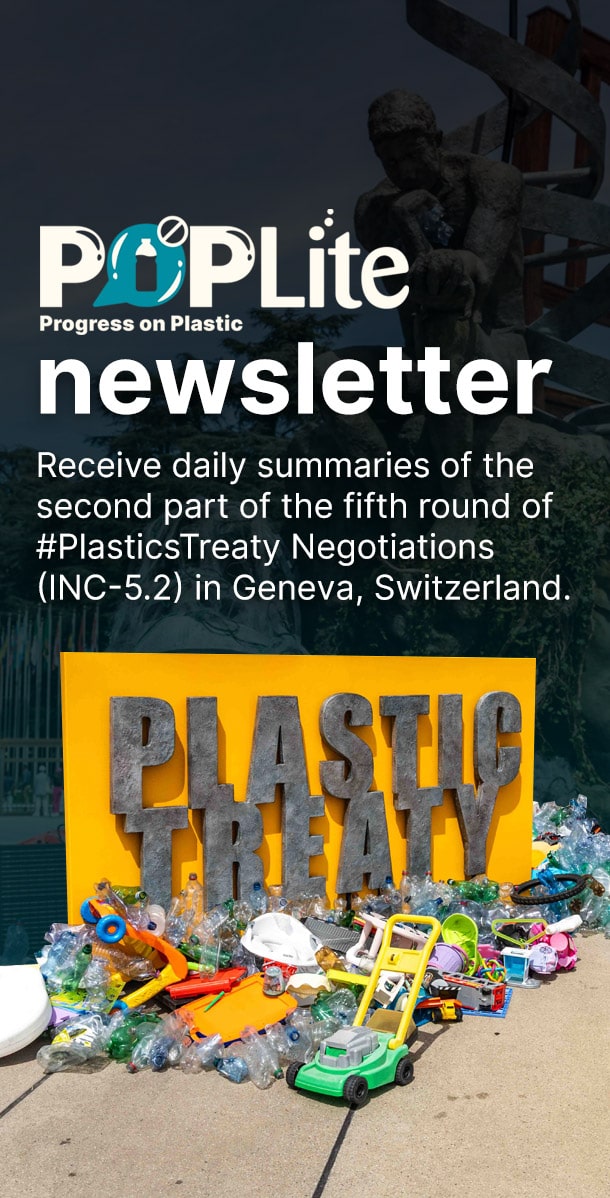When I say the word “plastic” what immediately comes to your mind? Is it an image of the sea turtle and the straw? The bag you last used at a grocery store? A beach you know that’s coated in pollution? The manufacturing plant in your neighborhood? It’s likely a combination of these things. But one thing that rarely comes to people's mind when we think of plastic is sea level rise, melting ice caps: climate change. Plastic is such a multifaceted issue, but its link to climate change is not always as apparent as it needs to be.
When I was eight years old, my family went 13 days without power as Hurricane Ike passed over Houston, Texas. When I was 10 years old, I watched as the coast I grew up on was covered by 134 million gallons of crude oil flowing from the British Petroleum Deepwater Horizon oil rig. When I was 17, I watched my street fill with floodwaters as Hurricane Harvey sat over Houston for four days.
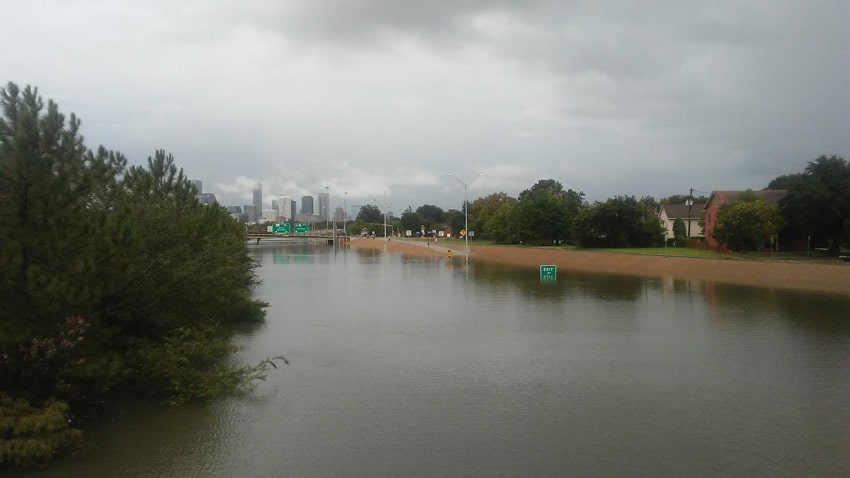
Downtown Houston, Texas flooding caused by Hurricane Harvey. Taken about 2 minutes from my house. Photo Credit: Anthony Gordon
I remember when Hurricane Harvey hit my Junior year of high school; I was just starting to think about my college applications and what I wanted to do after high school. Experiencing all of those disasters growing up, lit a spark in me to care about environmental issues. But the timing of Harvey is when it all clicked. I stumbled upon Eckerd College completely by chance, and immediately knew this is where I needed and wanted to be. Eckerd is a small school right on the water with a strong emphasis on environmental programs. Going there seemed like the perfect way for me to start getting involved with the things I cared about. When I got to Eckerd as a passionate Environmental Studies major, I had the mindset of wanting to make a difference on the issues affecting my community, but I had none of the tools to do so. My third day of college I was introduced to an organization doing voter registration work, and became really interested in this whole concept of organizing as a student, with other students, for students. Some of the leaders of this group, Florida PIRG Students, heard about my interest in the environment and encouraged me to run a beach clean up and brand audit for our school. I had zero idea what this meant, but did some research and ran a successful brand audit!
Brand audits are a citizen science initiative that allows us to document the brand and companies responsible for plastic pollution. (Check out more information here! )
This was my first time taking direct action around the impacts of plastic pollution with other passionate people. From then on, I knew I wanted to continue organizing in this way.
As I began to think more deeply about the work I was doing with PIRG, I started to really understand the intersections between plastics and well, everything, but most clearly, with the climate movement.
Plastic is a fossil fuel-based product. Most of that oil comes from fracking, an invasive process that releases potent greenhouse gases, harms communities, and pollutes waterways, to highlight some of its many negative impacts. It’s then transported to a refinery, with transportation and the refinement process both being greenhouse gas intensive processes. The final plastic product then used for just a few minutes on average, and put into the waste stream. Additionally, many areas incinerate their trash - something the industry markets as “waste to energy”, which is just fancy language for burning plastic, releasing even more pollutants into the air (into our lungs). The placement of waste, burning of waste, production of plastic, placement of petrochemical and refinement facilities all lead to climate change, and all have an extremely disproportionate impact on communities of color, like the area I grew up in.
Read more about this in detail: https://yaleclimateconnections.org/2019/08/how-plastics-contribute-to-climate-change/

Understanding those processes allowed me to see that by working on plastic issues, I would also be working towards stopping the worst impacts of climate change, like the hurricanes I know all too well. I knew more work needed to be done to push the movement away from plastics forward, while bringing light to its intersections so, in the Spring of 2019, I decided to take on a huge project to get my campus to sign onto the Break Free From Plastics Campus Pledge eliminating the purchasing of all nonessential single-use plastics. Throughout that Spring and Summer, I worked with the Post Landfill Action Network (PLAN), our campus Office of Sustainability, and the Eckerd Reduce Single-Use Project to ultimately get the president to sign onto this progressive plastic policy. He officially signed in fall of 2019- only about 10 months after I started the campaign! A little over a year later, more than a dozen campuses enrolling more than half a million students have committed to phasing out all single use plastics.
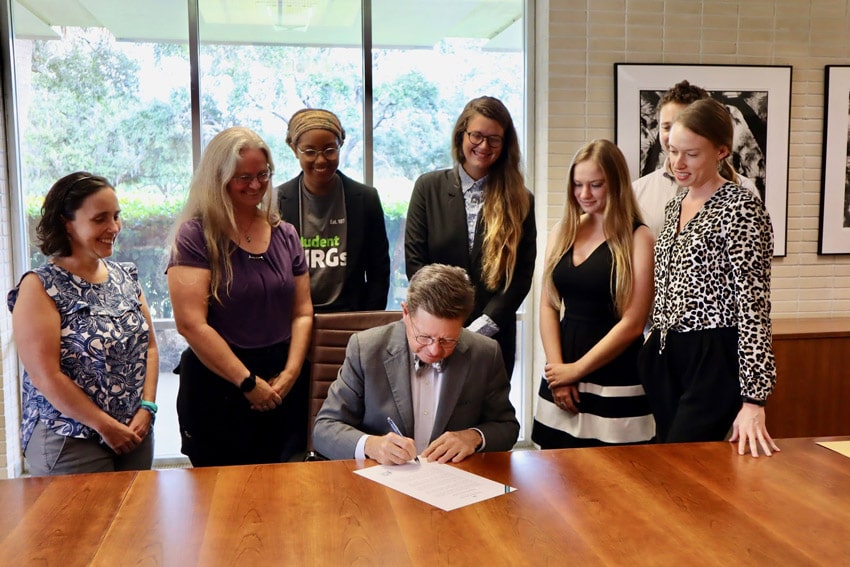
The Eckerd College Break Free From Plastic Pledge being signed by former Eckerd College President Eastman. I am pictured third from left!
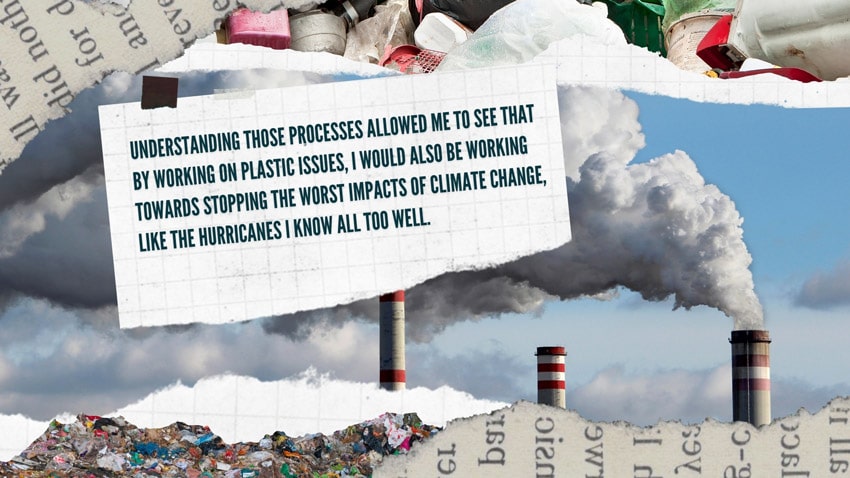
Though an individual, throughout all of this work I felt like I was joining a generation of changemakers from around the globe. Young people have been instrumental to the modern climate movement -- mass climate strikes in the streets to school walkouts, to authoring best selling books -- youth have made clear that our voices have to be heard in order to make any sort of change. Young people are also fairly prominent in issues of plastic pollution. The turtle and straw video launched a wave of anti-straw organizing, which has led to hard policies across the country. Unfortunately, these two issues are still seen as starkly separate, and to create the systemic change we need, must be viewed in the same lens.
Switching the narrative of how people understand plastic will be key to moving our movement forward, but so will centering the experiences of those who are impacted by the industry. I currently live near one of the largest petrochemical complexes in the world. Every year, I witness petrochemical plants catching fire, hear the familiar alarm of a shelter in place, and smell the fumes coming out of these plants. In 2017, Harvey also caused one of the largest chemical spills seen in the region. The oil that spilled into the Gulf of Mexico in 2010 was the same type of oil commonly used for plastic production. The creation of plastic, its consumption, and its disposal exacerbates the impacts of climate change. Plastic and climate are completely inseparable and must be tackled under the same lense.
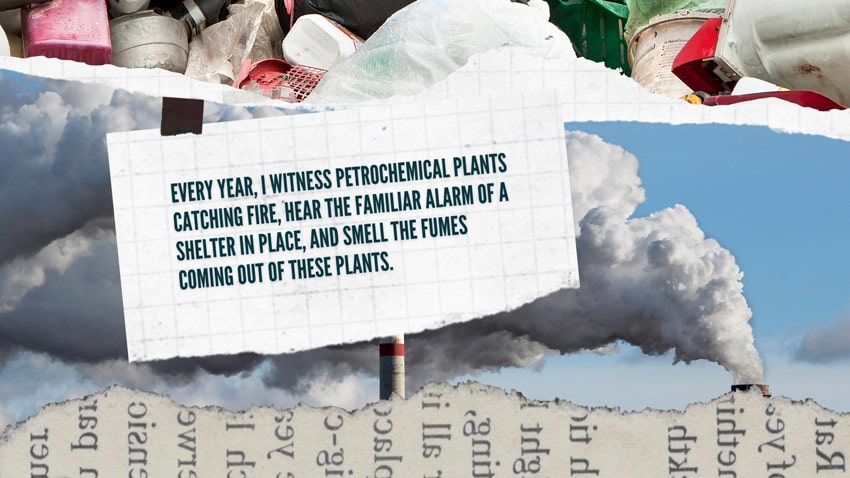
It is integral that we elevate the voices of those whose future depends on our actions: young people. Young people have played monumental roles in every successful movement for change thus far. We are seeing the impacts we have on the climate movement, and we are starting to see our imprint on the movement away from plastics and towards zero-waste communities. We are effective changemakers yes, but we also have a huge stake in all of these conversations. It is our future that is dependent on the actions of everyone today. We are a diverse generation, coming from frontline communities all over the world, who want to have a future with a livable world. So, we’re passionate, we’re eager, and we want to get involved.
The plastics movement can seem (and oftentimes is) overwhelming! Here are some actions you can take post reading this blog:
1. Check out some of the links left above! They lead to many of the resources I use.
2. Are you looking to get into organizing? Check out the Student PIRGs Activist Toolkit. Whether you’re getting your community to go plastic free, talking about elections, or just wanting to engage your community, this tool has so many great resources.
3. Want to get involved with reducing plastic at your campus? Find out all about the Break Free From Plastic Campus Pledge here and work with the Post Landfill Action Network!
4. Feel free to reach out with any questions at angordon@eckerd.edu
About the Author
Alex Gordon is a current Junior at Eckerd College studying Political Science and Environmental Studies. She is the Chair of the Eckerd Chapter of Florida PIRG Students and continues to work with the Post Landfill-Action Network and Student PIRGs to create more plastic free campuses.

